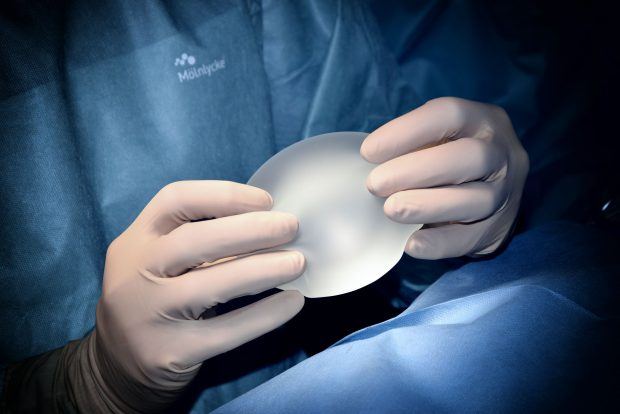Breast hypertrophy, also known as macromastia, is a rare condition that causes excessive growth of the female breasts.
While this is considered a benign condition, it can have a seriously detrimental impact on the lives of those affected.
In some cases, macromastia resolves itself on its own, but in others, breast reduction surgery is needed.
Read on to discover everything you need to know about breast hypertrophy, including:
- What are the symptoms of breast hypertrophy?
- What are the main causes of breast hypertrophy?
- How is breast hypertrophy diagnosed?
- What are the best treatments for hypertrophy of the breast?
- What is the outlook for women with breast hypertrophy?
What Are The Main Symptoms of Breast Hypertrophy?
The main symptom of hypertrophy of the breast is excessive growth of the breast tissue. This can occur gradually over several years, or happen rapidly in a matter of days and weeks.
Other common symptoms include:
- Breast pain
- Shoulder, neck, upper, and lower back pain
- Redness, itchiness, or warmness on or under the breast
- Infections
- Poor posture due to breast weight and size
Less common symptoms include:
- Loss of nipple sensation
What Causes Breast Hypertrophy?
It is still unknown what exactly causes this kind of hypertrophy, and although research is still ongoing, some possible triggers include:
- Pregnancy
- Puberty
- Certain medications such as bucillamine and neothetazone
- Certain autoimmune disorders such as lupus, psoriasis, and chronic arthritis
Idiopathic gigantomastia is the most common type of breast macromastia, and this is when the breasts grow excessively for no specific reason.
How Is Breast Hypertrophy Diagnosed?
Your doctor or another medical professional will talk you through your medical and family history and also perform a physical examination of your breasts. You are likely to be asked questions about your breast size, breast weight, any other symptoms you are experiencing, the date of your first menstruation, and any medications that you take.
In most cases, further diagnostic tests are not needed, and hypertrophy of the breast can be diagnosed on the spot.
What Are The Best Treatments For Breast Hypertrophy?
There is no standard treatment or medication for breast hypertrophy, as each case is different.
If any infections, ulcers, or pain are present, then these will be treated first with antibiotics, pain relievers, and other relevant medication. If macromastia is caused by pregnancy, this should naturally resolve itself after birth.
Other treatments include:

Reduction Mammoplasty
Reduction mammoplasty, more commonly known as breast reduction surgery, is a surgical procedure that reduces a woman’s breast size and overall breast weight. During breast reduction surgery, the surgeon will reduce the amount of breast tissue, remove any excess skin, and reposition the nipple and the dark skin surrounding it.
This type of surgery only takes a few hours, but most often, patients are required to stay in the hospital overnight.
If you are an adolescent with macromastia, it is recommended that you wait until after puberty before considering breast reduction. This is because this kind of hypertrophy has a significant chance of recurrence at this age.
Mastectomy
Another surgical treatment for breast hypertrophy, a mastectomy, involves removing all the breast tissue entirely rather than just some of it to reduce a woman’s breast size. After this surgery, you can get implants inserted to recreate the look of breasts. That being said, there is a high risk of complications with these types of surgery, so they are not the first recommendation when it comes to treating hypertrophy of the breast.
It is also worth noting that if you choose to have a double mastectomy, then you will not be able to breastfeed. As such, reducing breast size through a mammoplasty may be a better option for those who intend to breastfeed.
Medications
For those that do not wish to go down the surgical route, there are several medications that your doctor may prescribe to help prohibit the growth of breast tissue. These include:
- Tamoxifen
This is a selective estrogen receptor modulator that is typically used in breast cancer treatment.
- Medroxyprogesterone
This is also known as the birth control shot, Depo-Provera.
- Bromocriptine
This is a dopaminergic receptor that is often used to treat Parkinson’s disease.
- Danazol
This is typically used to treat endometriosis and the symptoms of fibrocystic breast disease in women.
However, more research is still needed into these drugs and their effectiveness in treating macromastia, as results can vary significantly from one woman to the next.
What Is The Outlook For Women With Breast Hypertrophy?
As a rare condition, the exploration, and research into macromastia have not always gotten the attention it deserves.
Fortunately, there is good news for women who struggle with both the physical and mental ramifications of this condition. There are several leading medical professionals and researchers across the globe who are exploring both the causes and treatments for breast hypertrophy with the hope of gaining a better understanding of this rare condition.

Take Amy Desrochers DiVista, for instance, who works for the Division of Adolescent/Young Adult Medicine Department of Medicine in the United States. Her research focuses on the effects that breast macromastia and breast reduction surgery has on adolescents. She also looks into the physiological impact that breast conditions such as breast hypertrophy and breast asymmetry have on young women.
There’s also Claudia Maria Santos Aldrighi, who works at the University of São Paulo School of Medicine in São Paulo, Brazil. Her field of specialty is plastic surgery, and her research focuses on surgical treatments such as mammaplasty, mastectomy, and reconstruction surgery.
Find out more
To find out more about what these researchers and other top influencers within the healthcare industry have to say about breast macromastia, check out the KOLs search engine.
This is a global database that contains over 50 million Key Opinion Leaders (KOLs) within the fields of science, technology, and healthcare.
If you suffer from breast hypertrophy, you should know that you do not need to struggle with this condition for your whole life. Not only are there several treatment options available to you that can help reduce your breast size and prevent their growth further, but research into new and innovative treatments and medications is ongoing.
Whether you want to find out more about reduction mammaplasty and how it can improve the symptoms of macromastia, or you prefer to try medication first, don’t be ashamed to talk to your doctor about your options. No woman should have to live in pain or have their quality of life reduced due to their breast size.





![women [longevity live]](https://longevitylive.com/wp-content/uploads/2020/01/photo-of-women-walking-down-the-street-1116984-100x100.jpg)









